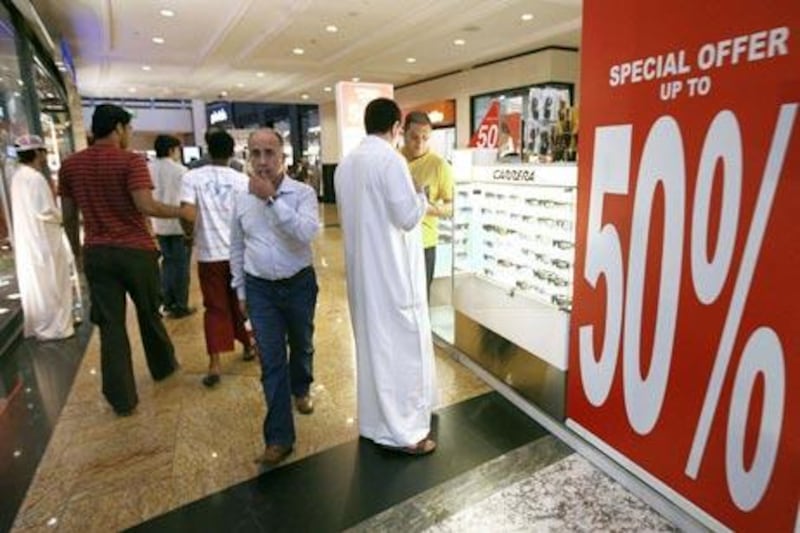Adarsh George is playing it safe. Since signs of the economic slowdown began to show in the UAE, the associate vice president of IAS Media in Dubai, says he has cut spending on clothing, and cologne, and is not upgrading his mobile phone as quickly as he once may have. "I might have cut Dh1,500 (US$408) or Dh2,000 out of my monthly expenses," Mr George says. But when the world markets rebound, he says he plans to keep his thrifty routine. "I want to show myself that I can live within these parameters," he said. "I'm not losing out on anything." Retailers in the UAE have taken, at times, extreme measures to stay viable while shoppers scale back. From offering deeper discounts to closing stores, shopkeepers have focused on just making it through what some have called the "survival year", with sights set on early next year for a retail recovery. But some analysts say consumers have found this new wariness habit forming. After the recovery, they say, the thrifty ways of some shoppers will became lifelong habits. Already, as talk spreads of signs of recovery, there is evidence that consumers have lost their appetites for high-margin products, according to a report by the international management consultancy AT Kearney. "They are moving from conspicuous consumption to virtuous consumption; more thoughtful purchasing to get more for their money," the report states. "As people become accustomed to having less they'll want and need less, so shopping will become a careful investment rather than a recreational activity." Robert Ziegler, the vice president of AT Kearney in Dubai, says residents have learned a hard lesson in the past six months, when the economic downturn began to affect the Emirates. "Everybody who is in that situation, who has had banks knocking on their door asking for money back or having their car impounded, they've all had an enormous scare and everybody's environment is going to change," Mr Ziegler says. "People are investing in government bonds, cash or gold. That's where people are putting their money nowadays. That's an expression of extreme conservatism." Retailers will need to work harder to attract the same consumer spending and same margins as before, Mr Ziegler says. "Distribution is over now. Now it is selling. People have less money to spend and you have to compete for that money." Nielsen, the worldwide market research company, found in a survey that local consumer sentiment is "pensive". In the UAE, 78 per cent of respondents said they believed the country was in a recession. And 53 per cent said they believed the country would not come out of the recession in the next 12 months. The company found that 24 per cent of respondents in the US, western Europe, Brazil, Russia, India and China say they will continue to cut back on items such as takeaway meals, even after economic conditions improve. "For the coming few months, they will be restrictive in terms of their spending," says Akash Pal, Nielsen's head of research in Dubai. Peter McElwaine, the chief executive of Jumbo Electronics, says the thrifty attitude is going to be difficult to shake. He says Jumbo has seen a clear trend of downtrading to less expensive items and, although sales are up, the overall value of sales is down. "Any of us who expect to be back to where we were a year ago is obviously pie in the sky," Mr McElwaine says. "We're looking at three years to get back, probably, to where the market was" a year ago. Sales were then growing, without adding new stores, by 30 per cent to 40 per cent annually, he says, but that will no longer be possible and Jumbo will have to look at other ways to increase its business. "Because of the situation right now, there are opportunities that present themselves," Mr McElwaine says. "There are assets that are going cheap. There are certain businesses that are not faring as well as others, that may be struggling. So there are acquisition opportunities." One strategy retailers can employ is to shift from larger stores to smaller, more conveniently located outlets that also cost less to operate, Mr Pal says. "Smaller formats will benefit and hence we see the likes of Carrefour Express [and] Panda stores springing up round the corner." Shopkeepers must also work with their suppliers to "clean up the retail space", Mr Pal says. This means eliminating products and brands from the shelves which are not selling, and adjusting pack sizes so that items can be offered in the quantities shoppers want to buy. Despite these challenges, the UAE is still fourth in a ranking of most promising retail markets in the emerging world behind India, Russia and China. But Mr McElwaine says Jumbo is putting its expansions on hold until there is more "clarity in the future". "We still don't believe we have seen the end of the slowdown," he says. "People use this term 'green shoots'. I'm just saying there are far less brown leaves around. So I'm taking a more conservative view." aligaya@thenational.ae
Consumer thrift to hamper UAE retail rebound
Analysis Retailers in the UAE have taken, at times, extreme measures to stay viable while shoppers scale back.

More from the national




